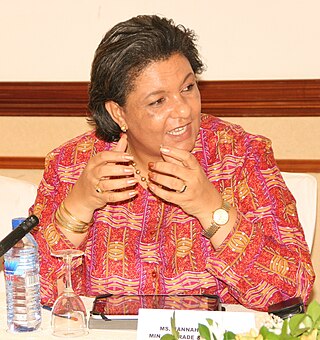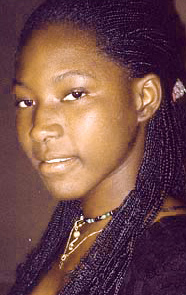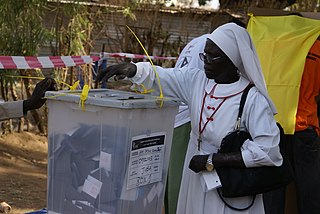Overview of the status of women in Vanuatu


Women in Vanuatu are women who live in or are from Vanuatu. This includes their education, healthcare, political, and economic information.


| Part of a series on |
| Women in society |
|---|
 |
Women in Vanuatu are women who live in or are from Vanuatu. This includes their education, healthcare, political, and economic information.
In relation to the labor force, based on data in 2006, Vanuatuan women workers comprised 49.6% of the workforce of Vanuatu. [1]
According to UN Women, women in Vanuatu play a significant role in the fields of "civil service and the public sector". Under the 30-year-long democracy of Vanuatu, the women of Vanuatu are under-represented in the political arena of Vanuatu. At any one time, there have been a maximum of two women members out of a total of fifty-two members of the parliament of Vanuatu. There were 3.8% of women in Vanuatu who held seats in said parliament. They are also under-represented at the local (provincial and municipal) levels of politics. [1]
Despite being under-represented in politics and making a living in a "male dominated and largely patriarchal society", the World Bank reported in April 2009 that Vanuatuan women are increasingly becoming involved in "private sector development and in the market economy". [2]
In Vanuatu, attending school is not mandated by the state and girls have low attendance compared with their male counterparts. Reasons for low attendance stem from lack of compulsory requirement, not enough support by both family and state, with the larger issue being lack of infrastructure supporting female menstruation. Little hygienic resources such as bathrooms, toilets, and feminine hygiene products cause most girls to drop out of school. Cultural factors and gender roles of Vanuatu girls also affect if they can go to school and how often as many girls are married at a young age. Along with a Vanuatu woman's place being at home while the male population works and is educated. [3] While overall literacy rate is 87.5%, adult female literacy is 54%. [4] There are efforts to raise that number with grassroots projects like Mama’s English Class, which go to villages empowering women through literacy. Lack of literacy can severely hold women back economically in Vanuatu with male authority held in higher esteem than women in leadership roles in almost all areas of life. There are large disparities between women who are educated and those who are little to no education. [5]
Although there have been great steps taken to meld traditional culture for the equity of all persons (especially women), healthcare is still a concern as 79% of the population live rural areas. The concern of respiratory illness from the smoke of cooking oils on women, children, and the elderly was focused on by the delegation drafting the Environment Act. Along with maternal health services that are needed in rural areas of Vanuatu to lower mother and infant mortality rates. [6]
During the aftermath of Cyclone Pam (March 27, 2015), Women in Vanuatu waited for healthcare aid by blocking the road. An overwhelmed United Nations Population Fund (UNFPA) team distributed 400 initial dignity kits and other feminine hygiene to women and lactating mothers. As with many humanitarian situations, women and girls were not prioritized in the national relief effort responses. [7]
While Vanuatu’s reproductive and sexual health for females and girls is some of the highest in the region, it also has a high adolescent birth rate (ages 15 – 19) in the region. Even with a high contraception use rate, around 20-30% of women in partnerships/marriages do not have access to contraceptives. Nearly two-thirds of the female population have encountered and experienced physical and sexual violence. That being said, usually the decision to use contraceptives is not without fear of this type of violence occurring to her personally. The Ministry of Health continues to survey and map the sexual and reproductive needs of women for improvement to the system. While hospitals and Health Centres have a wide range of reproductive health support, aid posts do not have enough supplies nor staffing and funding. Aid Posts, however, are run through Village Health Worker Program reporting mechanisms, restricting knowledge of the activities of an Aid Post. Gender equity and equality programs are needed in order to help in the effort to lower gender-based violence and sexual harassment (rape, molestation, etc). [8]
Economically speaking, the females in Vanuatu have been working toward gender and climate reforms within the government. As men are afforded opportunities that women in Vanuatu culture do not have, there is a push for economic equity. The IFC and government reports show that women can make a significantly large economic profit when given the opportunity. However, with the growing domestic abuse of women and the expectation that they will work a double workday (occupational and domestic) due to the male-dominated and patriarchal based societal constructs and traditions. Political, women are working to get improved policy dialogue, legal framework, business training, and other equity opportunities in legislation for the benefit of women in Vanuatu. Especially as while a minority, women make-up and have a significant part in the business within Vanuatu. [9]
Vanuatu’s first female-only political party has been created to help females get elected into positions of leadership within the government. This is due to there being very few females in parliament. For example, in 1987, Hilda Lini was the first female to be elected to parliament and while there have been a few women to follow her, they do not hold a large percentage in the government. Especially, in a male-dominated political field, it is difficult to see gender-equity and equality when as Andrina Thomas says, political parties “are just using women as mere decorations and paying lip service to gender equality”. By having a female-only political party, there is hope that decisions on the well-being on citizens will be more ethical, diverse, and equal between genders. [10]
Cultural Politics also affect women in Vanuatu as they have an expectation to wear national dress exclusively while also having contemporary desires to dress. This “mother” shapeless floral frock is supposed to represent the modest and Christian/tradition abiding woman. Originally, Vanuatu women were made to wear them by missionaries to symbolize modesty in an ideal viewpoint from western culture. Young women have begun redefine what this looks like through modernity by way of long, loose surf shorts and shirts. The island dress is a representation of national identity through an everyday costume. While this dress is tied to Vanuatu identity, the cultural connotations do not mean anything to new young generations of women. This is changing cultural politics in Vanuatu and how women are represented and dress. The dress has deep implications of women’s bodies having moral context beyond themselves, making young women wish to change this narrative through their own cultural politics based in their own dress. [11]

A woman is an adult female human. Prior to adulthood, one is referred to as a girl.
This is an index of articles related to the issue of feminism, women's liberation, the women's movement, and women's rights.
Gender equality, also known as sexual equality or equality of the sexes, is the state of equal ease of access to resources and opportunities regardless of gender, including economic participation and decision-making; and the state of valuing different behaviors, aspirations and needs equally, regardless of gender.

Sexual and reproductive health (SRH) is a field of research, health care, and social activism that explores the health of an individual's reproductive system and sexual well-being during all stages of their life.
Gender inequality is the social phenomenon in which people are not treated equally on the basis of gender. This inequality can be caused by gender discrimination or sexism. The treatment may arise from distinctions regarding biology, psychology, or cultural norms prevalent in the society. Some of these distinctions are empirically grounded, while others appear to be social constructs. While current policies around the world cause inequality among individuals, it is women who are most affected. Gender inequality weakens women in many areas such as health, education, and business life. Studies show the different experiences of genders across many domains including education, life expectancy, personality, interests, family life, careers, and political affiliation. Gender inequality is experienced differently across different cultures and also affects non-binary people.

The status of women in Ghana and their roles in Ghanaian society has changed over the past few decades. There has been a slow increase in the political participation of Ghanaian women throughout history. Women are given equal rights under the Constitution of Ghana, yet disparities in education, employment, and health for women remain prevalent. Additionally, women have much less access to resources than men in Ghana do. Ghanaian women in rural and urban areas face slightly different challenges. Throughout Ghana, female-headed households are increasing.

Women in Oman now pursue careers and professional training, moving from their previous and traditional role at home to the public sphere. In Oman, 17 October is celebrated every year as the Omani Women's Day with various pro-female events.

Women in Cambodia, due to the influence of the dominant Khmer culture, are traditionally expected to be modest and soft-spoken. They are to be well-mannered, industrious, and hold a sense of belonging to the household. It is expected that they act as the family's caregivers and caretakers, financial administrators, and serve as the "preserver of the home". As financial administrators, women can be identified as having household authority at the familial level. Khmer women are expected to maintain virginity until marriage, become faithful wives, and act as advisors to their husbands. Women in Cambodia have also be known as “light” walkers-- "light" walking and refinement of the Khmer women is further described as being "quiet in […] movements that one cannot hear the sound of their silk skirt rustling".

Females in Nigeria have a basic human right to be educated and this right has been recognized since the 1948 adoption of the Universal Declaration on Human Rights (UDHR) According to a report in 2014, female education has an important impact on the development of a stable, prosperous and healthy nation state resulting in active, productive and empowered citizens. Educating girls develop growth rates, encourages independence of the girl child and reduces social disparities. In 2009, the Nigerian Population Council (NPC) observed that women with higher educational qualifications are more likely to be in formal wage employment than those at the level of primary school education.

Women in Chad, a landlocked country in Central Africa, are the mainstay of its predominantly rural-based economy and they outnumber the men. Chad is a country with diverse and rich cultural practices, such as male beauty pageants and long-kept-secret hair products. Despite their numbers in the general population, there are very few women in governmental positions and gender equality is far from being a reality in Chad. Chad is rated as the third worst country in Africa for gender equality by the World Bank. Additionally, there are few women who reach higher education, and many who receive a college degree do so outside of the country.
The World Health Organization (WHO) has defined health as "a state of complete physical, mental, and social well-being and not merely the absence of disease or infirmity." Identified by the 2012 World Development Report as one of two key human capital endowments, health can influence an individual's ability to reach his or her full potential in society. Yet while gender equality has made the most progress in areas such as education and labor force participation, health inequality between men and women continues to harm many societies to this day.

Gender inequality in Honduras has seen improvements in some areas regarding gender inequality, while others have regressed towards further inequality since in 1980s. Comparing numbers from the 2011 and 2019 United Nations Human Development Reports helps to understand how gender inequality has been trending in Honduras. In the 2011 Human Development Report rankings for the Gender Inequality Index, Honduras ranked 121st out of 187 countries. In the 2019 Human Development Report Honduras dropped to 132nd out of 189 countries in the rankings. As the country's overall ranking dropped, it indicates that progress towards gender equality is not being made on the same level as other countries around the world.

Women in South Sudan are women who live in and are from South Sudan. Since the Independence of South Sudan on 9 July 2011, these women have gained more power but still face issues of inequality. Many women in this area do not have adequate access to health resources and education. While these women often face inequality, there has been progress since South Sudan's official declaration of independence. In recent years, this inequality has gained national attention and people have become more interested in the issue of child marriage that this area faces. Along with this, there has started to be a focus on the very high level of maternal mortality in South Sudan. With a maternal mortality rate of 789 deaths per 100,000 live births, South Sudan has one of the highest rates in the world.
The socioeconomic impact of female education constitutes a significant area of research within international development. Increases in the amount of female education in regions tends to correlate with high levels of development. Some of the effects are related to economic development. Women's education increases the income of women and leads to growth in GDP. Other effects are related to social development. Educating girls leads to a number of social benefits, including many related to women's empowerment.
Nepal, a Himalayan country situated in South Asia, is one of the poor country because of undeveloped resources. It has suffered from political instability and has had undemocratic rule for much of its history. There is a lack of access to basic facilities, people have superstitious beliefs, and there are high levels of gender discrimination. Although the Constitution provides for protection of women, including equal pay for equal work, the Government has not taken significant action to implement its provisions.

Gender inequality in Sri Lanka is centered on the inequalities that arise between men and women in Sri Lanka. Specifically, these inequalities affect many aspects of women's lives, starting with sex-selective abortions and male preferences, then education and schooling in childhood, which influence job opportunities, property rights, access to health and political participation in adulthood. While Sri Lanka is ranked well on several gender equality indices in comparison to other countries in the region, there are also some sources that question the verity of these indices. However, globally, Sri Lanka ranks relatively lower on gender equality indices. Overall, this pattern of social history that disempowers females produces a cycle of undervaluing females, providing only secondary access to health care and schooling and thus fewer opportunities to take on high level jobs or training, which then exacerbates the issue of low political participation and lowered social rights, a cycle studied and noted on by Dr. Elaine Enarson, a disaster sociologist studying the connection between disaster and the role of women.
As of 2018, the African country Rwanda ranks in the top five countries for gender equality according to the Global Gender Gap Report. The idea of fairness that dominates this country arose after the genocide against the Tutsi that occurred in 1994. The government is committed to ensuring equal rights for women and men without prejudice to the principles of gender equality and complementarity in national development. These ideas are exhibited through the roles of Rwanda women in government, the respect for women's education and the role of women in Rwanda healthcare. The country also took an active stance against rape in genocide, created a national action plan after United Nations Resolution 1325, and is pushing towards ending gender-based violence.

Women living in Myanmar continue to face barriers to equality. After forty years of isolation, myths about the state of women's rights in Myanmar (Burma) were centered around the conception that Burmese women face less gender discrimination and have more rights than women in surrounding Southeast Asian nations. After Myanmar opened its borders in 2010, gender discrimination began to be seen by the international community. Currently, a variety of organizations--both domestic and international--strive to educate people that this is a misconception to better make strides towards protecting women's rights in Myanmar.
Examples of Gender inequality Papua New Guinea includes poverty, violence, limited access to education and health care, and witch hunts. Cases of violence against women in PNG are under reported. There is also a lack of services for women who experience violence. There are reports of sexual abuse by police officers, on arrest and whilst in police custody. These incidents lack documentation or investigation, consequently, perpetrators are rarely prosecuted or punished. The government of Papua New Guinea (PNG) has introduced legislation to combat these issues, though with limited success.
Foreign aid for gender equality in Jordan includes programs funded by governments or non-governmental organizations (NGOs) that aim to empower women, close gender based gaps in opportunity and experience, and promote equal access to education, economic empowerment, and political representation in the Hashemite Kingdom of Jordan.
{{cite web}}: CS1 maint: multiple names: authors list (link){{cite web}}: CS1 maint: multiple names: authors list (link)